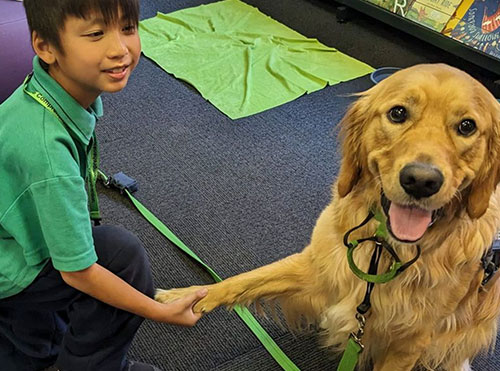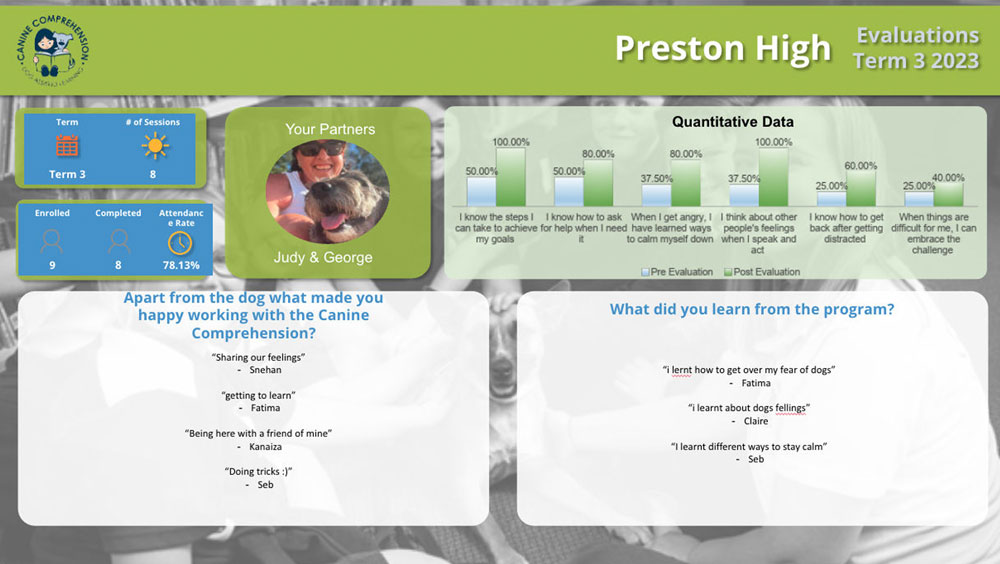
Our Blog
Ensuring Program Excellence: The Role of Evaluation in Canine Comprehension's School Programs

At Canine Comprehension, our dedication to delivering impactful programs for Victorian school students is underpinned by a commitment to evidence-based practices and a rigorous program evaluation. In this blog, we delve into the essential role of evaluation in ensuring program quality and efficacy, showcasing our comprehensive and meticulous approach to assessment and the valuable insights it provides for educators, stakeholders, and funding agencies.

The evaluation of any school activity is crucial for several reasons. The main reason is that it allows educators to determine whether the intended outcomes of the activity have been achieved. Moreover, it offers invaluable insights into the effectiveness of teaching methods, curriculum materials, and program design, empowering all involved to make informed decisions about instructional practices and resource allocation.
Evaluation also helps keep everyone accountable. Evaluation promotes accountability by demonstrating to everyone involved, including students, parents, guardians, administrators, and funding agencies, that educational initiatives achieve measurable outcomes. Transparent reporting of evaluation findings builds trust and confidence in the school's ability to deliver on its objectives.
Having data helps in resource allocation decisions. Schools can allocate resources more effectively to initiatives that significantly impact student learning and development by identifying successful programs and practices. This Evaluation data helps school leaders make informed decisions about program continuation, expansion, or discontinuation. By understanding the strengths and weaknesses of various activities, educators can prioritise initiatives that align with the school's mission and goals.
When evaluating school activities, we want to see if they match what the school wants to achieve and teach. This means checking if they fit the school's goals and what students should learn. We also look at if they help students with their specific needs. We use different ways to see if students are learning, like tests before and after the activity, tasks to do, and asking students what they think.
We also want to know if students are getting involved and taking part in the activity. We check things like whether they show up, join in discussions, and find the activity enjoyable.
We look at how healthy facilitators are running during the activity. This means we see if they use good strategies, talk well with students, and use helpful materials. We want to see if they make students think, solve problems, and get involved in learning.
It's essential that all students can take part in the activity, no matter who they are. We check if everyone has what they need to join in, like resources and help. We also see if students can share their thoughts and make choices and if there's support for different types of learners. By systematically evaluating these aspects of school activities, educators can ensure that they are meeting the needs of all students and continuously striving for excellence in education.
And we are no different - we understand the vital importance of evaluation.
We use different methods to evaluate our programs: pre- and post-evaluations, progress reports, and individual case studies. These help us understand how well our programs work and where to improve them. With pre-evaluations, we check what students know and can do before they start the program. After the program, we do post-evaluations to see how much they've learned. Comparing these two lets us see if the program is effective and where we can improve. We also send progress reports to schools. These reports show how students are doing in the program, both academically and behaviourally. They help teachers and parents work together to support students. Individual case studies let us look closely at how each student is progressing. This helps us understand how the program is helping different types of students. By seeing what's working and what's not, we can improve our programs for everyone.
Canine Comprehension remains dedicated to evidence-based practices and program evaluation to ensure excellence in our school initiatives. Through transparent accountability and ongoing improvement efforts, we strive to make a positive difference in students' lives across Victoria.
If you want more information about our programs, click here.
